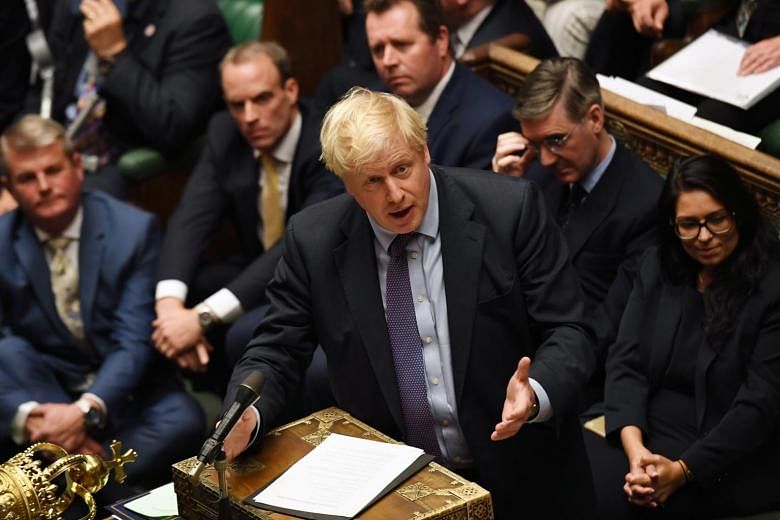British Prime Minister Boris Johnson has urged his country's Parliament to adopt the legislation required for Britain to leave the European Union over the next three days, in a last-minute rush to complete a process which has dragged on without resolution for more than three years.
But although Mr Johnson has got further than any of his predecessors in pushing through the separation arrangements with the EU, chances that Britain will leave the union as scheduled by the end of this month remain slim.
Meanwhile, calls for another referendum on whether the entire project of leaving the EU is feasible are growing.
Mr Johnson, who has been in power only since July, defied predictions by concluding a markedly flexible deal which offers the prospect of a relatively orderly and friendly separation from the EU, in an effort to minimise the feared disruption to trade.
The deal also overcomes the biggest hurdle to the talks with Europe: The status of the border across the island of Ireland, dividing Northern Ireland, which remains part of the United Kingdom, from the Republic of Ireland, which continues to be a member of the EU.
Unlike Mrs Theresa May, his predecessor who saw her political career destroyed by domestic rows over Brexit, Mr Johnson now has a chance of uniting his ruling Conservative Party around the EU deal.
The snag is that the Conservatives do not enjoy an overall parliamentary majority; they control only 288 of the 650 seats in the House of Commons, and Labour, the main opposition party, has every reason not to cooperate.
The result is parliamentary guerilla warfare in which tactics matter far more than substance.
Mr Johnson resorted to the unusual measure of recalling Parliament for an extraordinary meeting last Saturday in order to get his Brexit deal approved by the end of this month. "The public doesn't want any more delays, neither do other European leaders, and neither do I," he said. "Let's get Brexit done on 31 October and move on."
But the Labour opposition succeeded in claiming that it can hardly be expected to approve a complex deal without knowing its full context and implications. Approval of the Brexit arrangements was, therefore, withheld until the British government published the legislation which will put the separation from the European Union into effect in domestic British law.
Mr Johnson has now done precisely that, by publishing the draft legislation required for the separation from the EU, and the government is now hoping to push it through Parliament by Friday evening.
The draft legislation was first presented for debate yesterday. Lawmakers were expected to vote on approving it in principle, be-fore moving on to vote on the timetable for the remaining stages of the legislation.
The chances of the law being passed by Friday look highly unlikely. To start with, the draft legislation is 110 pages long, and there is no precedent for passing such a law so quickly.
"Ministers are trying to bounce MPs into signing off a Bill that could cause huge damage to our country," complained Mr Jeremy Corbyn, the opposition leader.
More importantly, lawmakers are uncovering an array of details which they do not particularly like.
Opponents of the EU are incensed by revelations that a special British governmental agency will be established to look after the status of European Union citizens living in Britain at an estimated cost of around £150 million (S$264 million) over the next decade, or that Britain may still have to follow many of the EU's labour regulations for years to come.
Meanwhile, those who wish to keep Britain in the EU complain that the deal which Mr Johnson negotiated is harsher than any of the previously suggested arrangements, and that they are being asked to sign off on a blank cheque as they still have no idea what the final and permanent trade arrangements between their country and the EU will be.
Ultimately, however, the tussle is about politics rather than the finer details of legislation. For, it is by now clear that an early general election is inevitable, and the parties are positioning themselves for the polls.
Mr Johnson wants to go down as the man who has finally delivered on Brexit; that, he hopes, will inspire his Conservatives who, despite their divisions, still have the best chances of emerging as the strongest party after the ballots.
The Labour opposition, meanwhile, wants to keep the Brexit question unresolved for as long as possible because it reckons this is the surest way of discrediting the government.
But the biggest danger for Prime Minister Johnson is that the opposition may join hands with a few Conservative rebel MPs and impose the condition that the separation agreement with the EU should be put to a fresh referendum.
All opinion polls indicate that, if given another opportunity, a majority of Britons may well decide to keep their country in the EU.











